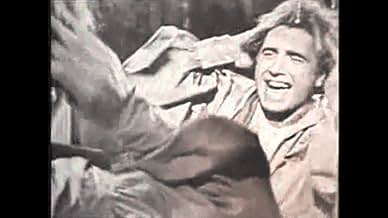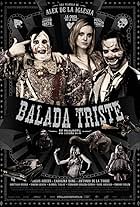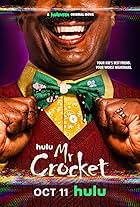Photos
- Director
- Writer
- All cast & crew
- Production, box office & more at IMDbPro
Storyline
Featured review
Pagliacci is a very special opera to me, then again I'd probably say that for any of the operas that I sang in the chorus in. While I also highly recommend the 1968 and 1982 versions, I think after seeing this I have found the best Pagliacci I have seen. The picture quality is a little grainy, but the camera work is generally fine even with a couple of extreme close ups.
The sound is decent also, with all the crucial scenes having the right impact, some of the softer moments may sound a tad monophonic but compared to other opera productions/films before or during this time I was impressed. Visually this Pagliacci is impressive. The sets may not be the most beautiful I've seen but they are very effective and manage to look more than sets constructed for the stage, likewise with the costumes, especially Tonio's and Canio in his Pagliaccio guise.
Musically, this is outstanding, doing justice to such an amazing work. I just prefer Karajan's marginally more romantic approach, but the conducting is more sensitive and less broad(in a good way) than Levine's reading. The chorus play powerfully and beautifully, Vesti La Guibba is very poignant, the prologue is nuanced and Non Pagliaccio Non Son is second only to Karajan for the 1968 version as the most dramatic reading of that particular scene.
When it comes to the staging, it is compelling throughout and true to the action involved in the story. The chorus numbers are not too chaotic and they are sung with attention to balance, pitch and diction, and Corelli and Gobbi especially live their respective arias. My favourites though are in the final scene, and they are Corelli throwing his wig at Micheluzzi's Nedda and the most painful and most honest uttering of "La Commedia E Finita" I have ever heard.
The principal performances are among the best I've seen in these roles. Mafalda Micheluzzi is an excellent Nedda, the singing is radiant especially in her song to the birds and her acting especially in Act 2 is riveting, she is vulnerable and bitchy, but she is also witty and excels even more so at the increasing panic in Non Pagliaccio Non Son. Lino Puglosi is a sympathetic Silvio, a role like I have said in previous reviews of Pagliacci that contrasts ideally with the more brutish role of Canio, and Mario Carlin is a charming Beppe with his serenade in Act 2 him at his best here.
However, there are two performances that stand out. One is Tito Gobbi, for me one of the finest Tonios there ever was. Although it was still a good voice, I can perhaps think of baritones with more beautiful voices than Gobbi's, like Merrill or Ruffo, and the baritone with the best high A flat in the prologue is between Milnes and Warren. What makes Gobbi stand out is how he interprets the role, Milnes and especially Tibbett were very exciting actors but Gobbi was unique, right now I can think of few baritones who match his musicianship or his ability to not just embody the role but also make it three dimensional. Gobbi does do that, and in his nuanced performance of the prologue alone.
Especially good is Franco Corelli. Some may say he is not quite their idea of a middle-aged brute that Canio is in a way, Corelli being very tall and one of the handsomest men on an opera stage, but you forget that because Corelli is the most thrilling Canio I've seen. I am not disputing Vickers and Domingo in any way as they are incredible in this difficult role too, just that Corelli's voice is so beautiful with such a ringing, dark quality to it, his musicality is superb and the poignancy of Vesti La Guibba and brimming intensity of Non Pagliaccio Non Son show him at his very best dramatically.
Overall, a must see, it really does give definition to the phrase opera at its finest. 10/10 Bethany Cox
The sound is decent also, with all the crucial scenes having the right impact, some of the softer moments may sound a tad monophonic but compared to other opera productions/films before or during this time I was impressed. Visually this Pagliacci is impressive. The sets may not be the most beautiful I've seen but they are very effective and manage to look more than sets constructed for the stage, likewise with the costumes, especially Tonio's and Canio in his Pagliaccio guise.
Musically, this is outstanding, doing justice to such an amazing work. I just prefer Karajan's marginally more romantic approach, but the conducting is more sensitive and less broad(in a good way) than Levine's reading. The chorus play powerfully and beautifully, Vesti La Guibba is very poignant, the prologue is nuanced and Non Pagliaccio Non Son is second only to Karajan for the 1968 version as the most dramatic reading of that particular scene.
When it comes to the staging, it is compelling throughout and true to the action involved in the story. The chorus numbers are not too chaotic and they are sung with attention to balance, pitch and diction, and Corelli and Gobbi especially live their respective arias. My favourites though are in the final scene, and they are Corelli throwing his wig at Micheluzzi's Nedda and the most painful and most honest uttering of "La Commedia E Finita" I have ever heard.
The principal performances are among the best I've seen in these roles. Mafalda Micheluzzi is an excellent Nedda, the singing is radiant especially in her song to the birds and her acting especially in Act 2 is riveting, she is vulnerable and bitchy, but she is also witty and excels even more so at the increasing panic in Non Pagliaccio Non Son. Lino Puglosi is a sympathetic Silvio, a role like I have said in previous reviews of Pagliacci that contrasts ideally with the more brutish role of Canio, and Mario Carlin is a charming Beppe with his serenade in Act 2 him at his best here.
However, there are two performances that stand out. One is Tito Gobbi, for me one of the finest Tonios there ever was. Although it was still a good voice, I can perhaps think of baritones with more beautiful voices than Gobbi's, like Merrill or Ruffo, and the baritone with the best high A flat in the prologue is between Milnes and Warren. What makes Gobbi stand out is how he interprets the role, Milnes and especially Tibbett were very exciting actors but Gobbi was unique, right now I can think of few baritones who match his musicianship or his ability to not just embody the role but also make it three dimensional. Gobbi does do that, and in his nuanced performance of the prologue alone.
Especially good is Franco Corelli. Some may say he is not quite their idea of a middle-aged brute that Canio is in a way, Corelli being very tall and one of the handsomest men on an opera stage, but you forget that because Corelli is the most thrilling Canio I've seen. I am not disputing Vickers and Domingo in any way as they are incredible in this difficult role too, just that Corelli's voice is so beautiful with such a ringing, dark quality to it, his musicality is superb and the poignancy of Vesti La Guibba and brimming intensity of Non Pagliaccio Non Son show him at his very best dramatically.
Overall, a must see, it really does give definition to the phrase opera at its finest. 10/10 Bethany Cox
- TheLittleSongbird
- Feb 10, 2012
- Permalink
Details
- Country of origin
- Language
- Production company
- See more company credits at IMDbPro
- Runtime1 hour 15 minutes
- Color
Contribute to this page
Suggest an edit or add missing content








